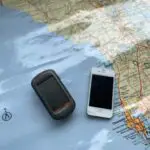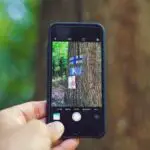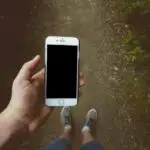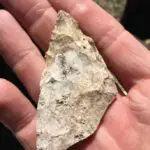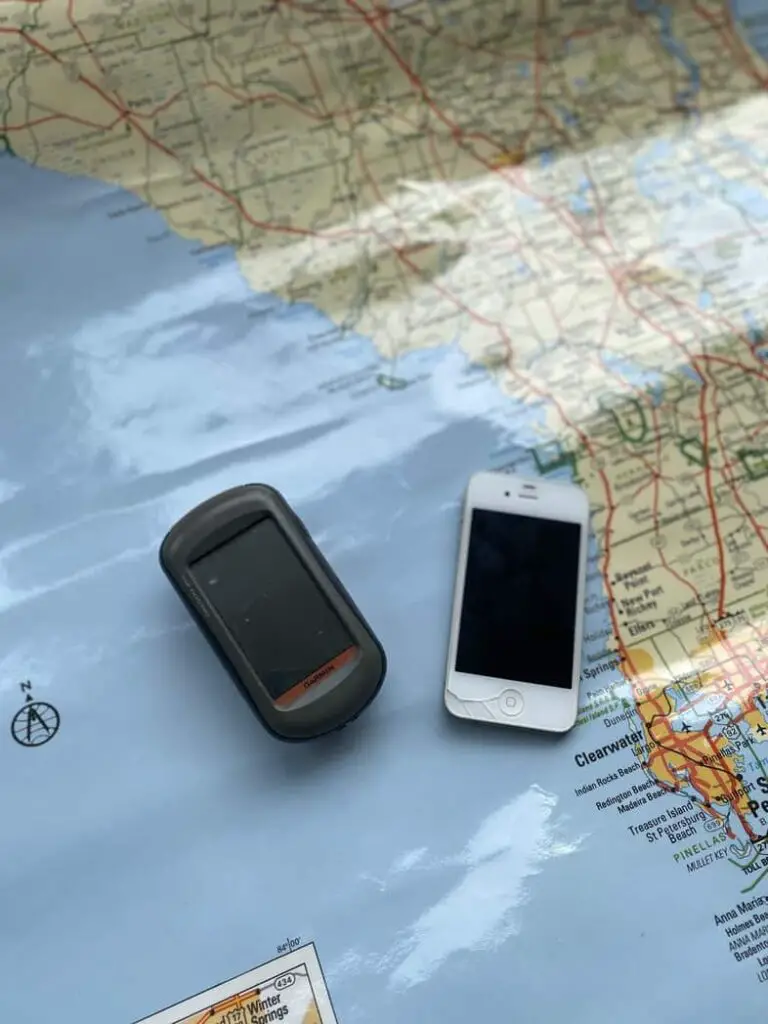
In the early days of geocaching, the only option available was a handheld GPS device. Now that smartphones have caught up to the dedicated GPS devices in their GPS functionality, the question arises, what are the pros and cons of GPS vs smartphones when Geocaching?
Table of Contents
Both GPS units and smartphones are fairly equal in their orienteering, cache finding, and cache placing capabilities. Which is better for you should be determined by your personal preferences and what other technology features you may need.
Since both smartphones and handheld devices have similar capabilities for the actual activity of finding caches, which do you use?
This is a heavily discussed topic across geocaching forums. The best way to decide is to look at the pros and cons of each and make your decision on which is a better fit with the kind of geocaching you want to do.
Handheld GPS Pros
This is the classic; for years this is how geocaching was done. Even after the advent of the early smartphones, the handheld GPS was more accurate for a long time before the phone GPS caught up.
Habit and Tradition
If you have been doing geocaching since the early days and have fond memories of trekking over hills with your trusty GPS unit in hand, you may not want to change.
Some people just love to be old-school and if this is the activity as they love it, why change? You can geocache with a GPS just as well as you ever could.
Battery
The battery life on GPS devices is more than enough for a full day of hunting for caches. Even better, when your charge is low, all you have to do is throw a couple of AA batteries in your device and you are back at full charge and good to go.
There is no hunting down a power outlet, no packing charging cords, and no waiting for a battery to charge. A few AA batteries take no space in a pocket or pack and they are relatively inexpensive.
Durability
This is where the handheld GPS really shines. These things are seriously tough. You can drop them, sit on them, get them wet, and they are going to keep working. If you’re bushwhacking into rugged terrain to hunt down some remote caches, this is a huge plus.
You can have real confidence that your device is going to survive whatever you put it through and still be able to get you to your target and out again without a hitch.
Handheld GPS Cons
No (Cell) Data
Since the GPS does only GPS, you lose all the added functionality that a smartphone has. You can’t call out if you get in trouble on a trail, you can’t do a quick search about something that interests you, and most importantly you can’t vary from your plan.
You can’t just download new caches on the fly; you have to load them ahead of time and that is all you will be doing that day.
Since you don’t have data and the same kind of screen features, you may miss a lot of fun details about the caches you find.
For instance, two geocachers have created a fictional war between themselves. Each cache is in the location of some imagined battle between them, and there are pages and pages of stories and photographs with each cache. It’s a blast to read them on site, but you would miss it all with a GPS.
Note: There are some handheld GPS units, like the Garmin GPSMap 66S that have geocaching app functionality, and can update caches, trails, and hints.
You Will Be Carrying Two Devices Instead of One
Let’s be realistic. You will probably not be leaving your phone at home; no one really leaves their phone at home anymore. So, if you use a GPS, you are going to be carrying two devices instead of one.
Camera
Some handheld GPS devices do have a camera, but it can’t really compare to the camera on any current smartphone. If you enjoy recording or creating photo albums of your adventures, a GPS camera doesn’t really cut it.
Extra Cost
Put simply, you are dropping money on an extra device that isn’t able to do much that the smartphone you already own can’t.
Smartphone Pros
Everyone has them, everyone uses them, so how well do they work for geocaching?
Multi-Functional
With a smartphone, you can look things up & enjoy little extras put in the listing for a cache, and call someone to bail you out if you get in trouble on the hunt. You can text a friend, or take a photo. You can have all these capabilities while only carrying one device.
Spontaneity
One of the best things about geocaching is the ability to go hunting at a moment’s notice.
Say you’re waiting to get your oil changed, check your phone, and see there is a cache that you never knew about, only 400 yards away, across the lot. You can just run over on the spur of the moment and log it!
What if you’re out geocaching and someone places a new cache nearby? If you’re geocaching with your phone you will see it; with a GPS you won’t.
Camera
While most handheld GPS units do have a camera, they do not approach the quality of even the average smartphone camera. If you want to take pictures, you want a phone. At this point, some smartphone photos are hard to tell from high-end camera photos.
Smartphone Cons
Fragility
Smartphones are not robust. Even the toughest of them are likely to break if dropped, or malfunction if they get wet. GPS units are much more durable and even made for heavy outdoor use and weather elements.
Battery & Data Usage
Smartphones use a built-in battery that must be charged, which drains much faster than a GPS battery. Even faster if you’re using data.
This can be mitigated fairly well by not having it running constantly when you have a good idea where you are heading, but it’s still a weakness that has to be accounted for.
Most smartphones last 8-12 hours without a charge, whereas many handheld GPS units can last up to 18 hours on a single set of AA batteries.
See Also: How much Data do Smartphones use when Geocaching?
Conclusion
There are plenty of accessories that make a smartphone function more like a GPS. There are a few accessories that make a GPS function like a smartphone.
There are some incredibly tough and protective cases for smartphones that can make them nearly as damage-proof as any GPS. You would have to be crazy to go geocaching without some kind of protective case on your phone.
Portable chargers are available for smartphones that aren’t much bigger than two AA batteries. That, combined with turning off the GPS function when you don’t need it, goes a long way toward solving the battery life issue between the two types of devices.
The only thing that can help fix a few of the features that are lacking on the GPS is to have a smartphone with you, at which point you may ask yourself… why not use the smartphone?
